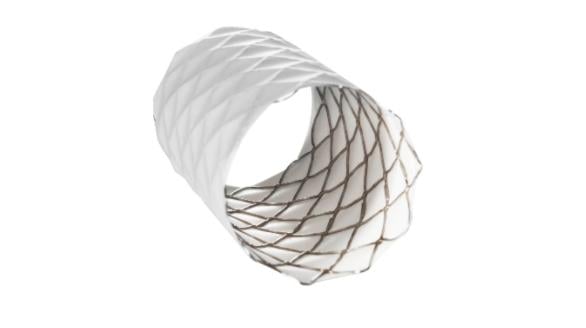
The NuMED 10-zig Covered CP (CCP) balloon expandable covered stent.
May 1, 2021 - An analysis of a new international registry reveals benefits of using a longer covered stent for interventional procedures in congenital heart disease patients with sinus venosus atrial septal defect (SVASD). The study was presented this week as late-breaking clinical research at the Society of Cardiovascular Angiography and Interventions (SCAI) 2021 Scientific Sessions.
SVASD is a rare adult congenital heart disease that permits shunting of blood from the systemic to the pulmonary circulation , causing excessive blood flow to the lungs. Until now, open heart surgical repair was the gold standard approach to dealing with this condition but is necessarily invasive. Covered stent implantation is a recently developed interventional procedure that can replace open heart surgery in some of these patients. However, according to the study authors, there is no "ideal stent" often leaving physicians to modify existing stents and frequently needing to "piggy back" several stents which adds to the difficulty and potential complications of the procedure.
Investigators analyzed outcomes of the NuMED 10-zig Covered CP (CCP) Stent, which is balloon expandable and intended for permanent implant in patients. It is composed of 0.013" platinum-iridium wire arranged in a 10 zig pattern that is laser welded at each joint and then over brazed with 24K gold. The 10-zig CCP stent was implanted in 75 patients between the ages of 11-75 years (median 45) from 12 centers. Pre-procedural assessment included diagnostic catheterization in 30, 3-D printed models in 34 and virtual models in 13.
Results showed 10-zig CCPs of 7-8 cm provided reliable SVASD closure with a low requirement for additional stents. An additional stent was placed in 4/5 (80%) with 5/5.5 cm CCPs, 18/29 (62%) with 6 cm CCPs, 5/18 (28%) with 7 cm CCPs, 5/22 (23%) with 7.5/8 cm CCPs and 0/1 with an 11 cm CCP. Patients were followed from three weeks to five years.
"Our findings reveal that the novel, longer stents are a reliable advance in technology that significantly reduces the need for implantation of additional stents. This helps to minimize many of the procedural risk factors and enhances the outcome. More SVASD patients will become eligible to undergo this novel interventional procedure and they will therefore avoid the need for open-heart surgery," said Prof Eric Rosenthal, M.D., lead study investigator and pediatric and adult congenital cardiologist at Guy's and St. Thomas NHS Foundation Trust in London, England. "These encouraging results support the need for further research into the long-term benefits of the 10-zig stents while widening its use in patients with SVASD."
Authors note that the longer covered stents are still investigational and require regulatory clearance at most centers.
Find more news from the SCAI 2021 virtual meeting
Find more congenital heart technology news


 January 05, 2026
January 05, 2026 









